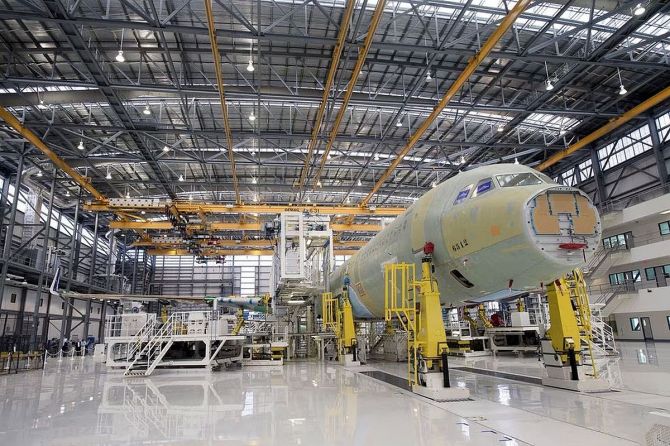‘The time is ripe’ for Airbus and Boeing to look at India in terms of setting up facilities to manufacture commercial aircraft, Aviation Minister Jyotiraditya Scindia said on Tuesday.

His comments came a day after IndiGo placed the world’s largest-ever single-tranche plane order with Airbus.
Air India had in February placed an order for 470 aircraft — 250 with Airbus and 220 with Boeing — which would be a mix of narrow-body and wide-body planes.
IndiGo on Monday placed an order with Airbus for 500 A320 family of aircraft, which are narrow-body planes.
When asked by Business Standard if Airbus should establish a manufacturing facility in India, considering these two giant orders, Scindia replied: “I do not think it would be right for me to advise Airbus on what it should do in terms of international strategy.
'That is for Airbus and Boeing to decide. But I think the time is ripe to look at India (to establish a manufacturing facility).”
The minister added that Airbus has already “looked” at India.
“The proof of the pudding is in the eating,” he said.
The C295 (military aircraft) facility is the first major step Airbus has taken in terms of setting up a manufacturing facility in India.
It will be set up in Vadodara, and the prime minister has laid the foundation stone for it.
“Airbus is already here,” he stated at a press conference.
In September 2021, India sealed a nearly Rs. 21,000 crore deal with Airbus to procure 56 C295 transport aircraft to replace the ageing Avro 748 planes of the Indian Air Force.
Under the agreement, Airbus will deliver 16 C295 planes from its Spain facility within four years, and subsequently, the remaining 40 planes will be manufactured in Vadodara, in collaboration with Tata Advanced Systems.
The minister had last month said that Indian carriers must have greater wide-body planes in their fleet so that they can operate a higher number of international flights, empowering India to become a civil aviation focal point.
A wide-body plane has a bigger fuel tank, allowing it to fly long distances like the India-US route.
IndiGo’s Monday order is only for narrow-bodied planes.
“This (IndiGo order) is a landmark event in the realm of civil aviation, but I do not think we should look at the fine print in terms of narrow-bodied versus wide-bodied because it is no longer a black-and-white area.
"It is a grey area. For instance, the A321s have an aeronautical range of roughly 3,800 nautical miles, and the A321XLR can go up to 5,000 nautical miles,” said Scindia.
“That provides you with the bandwidth and the range to be able to fly these aircraft internationally as well.
"It is IndiGo’s decision eventually, but I think it has somewhere stated it is looking at wide-bodied aircraft. It has already wet-leased some wide-bodied planes, and they are in operation today.
"I do not think you should sign on the dotted line just yet,” he added.
The minister called IndiGo’s order a new point of inflexion.
“The latest order by IndiGo talks of the potential this sector holds, not just for the airlines but also for the people who desire to travel by air,” he stated.
The expanded fleet of IndiGo and Air India will assist India in becoming a civil aviation nucleus.
He said that Delhi airport would become the first hub in India.
He also talked about supply-chain issues that engine and plane manufacturers are facing right now.
“We are very clearly facing them (supply-chain issues).
"As Covid-19 eases, these issues are expected to get resolved,” he added.











 © 2025 Rediff.com -
© 2025 Rediff.com -